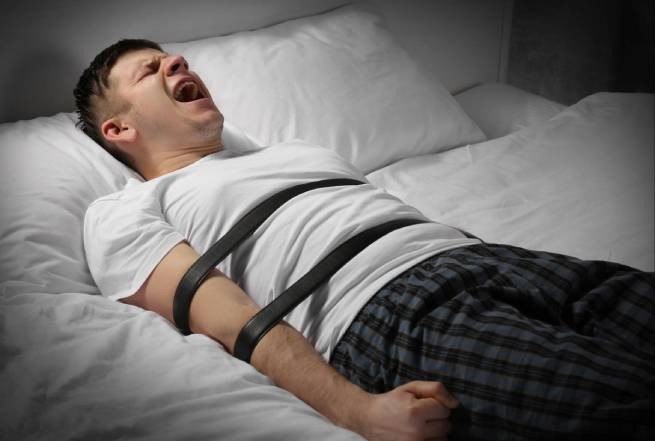Are you awake but can't move? This condition causes mild anxiety in some, and terrible fear in others. Sometimes it lasts several minutes, and the person begins to panic.
This is sleep paralysis. Let's try to figure out what it is with the help of scientifically established data, using information National Health Service, National Library of MedicineWebMD, Cleveland Clinic, Harvard Health Publishing, Medical News Today, and American Academy of Sleep Medici.
Sleep paralysis occurs between the stages of wakefulness and sleep – a person is conscious, but cannot move from several seconds to several minutes. For centuries, the symptoms of this condition have been associated with invisible night demons or witches that prevent one from moving and leaving the eerie state.
As a result of research, scientists came to the conclusion that in most cases Sleep paralysis is a sign that the body is unable to move smoothly through the stages of sleep. Some experience pressure on the chest or suffer from suffocation. Sleep paralysis, scientists say, is parasomnia – an undesirable event associated with sleep, abnormal activity.
This condition often begins in adolescence and may become more common in the 20s and 30s. It affects about 7.6% of people on the planet. Sleep paralysis usually occurs while falling asleep or waking up.
During REM sleep, the eyes move quickly and vivid dreams occur, but the body's muscles are relaxed to reduce movement. This muscle relaxation is controlled by the brain and is called rapid phase atonia. The purpose of atony is to reduce a person’s mobility to prevent the implementation of dreamed actions.
But during REM sleep, you suddenly wake up, returning to consciousness even though your muscles are still relaxed, in a state of atonia. Therefore, the condition feels like temporary paralysis. In addition to atonia, vivid images from REM sleep persist even when you are already in a conscious state. Research has revealed factors associated with the occurrence of sleep paralysis:
- anxiety disorders;
- poor sleep quality;
- irregular sleep patterns (due to jet lag or shift work);
- alcohol consumption;
- traumatic events;
- family history of sleep paralysis.
But Sometimes sleep paralysis can be a symptom of medical conditions, including depression, migraine, obstructive apnea, hypertension, narcolepsy*, anxiety disorders. Many people experience sleep paralysis only once or twice in their lives. However, people with narcolepsy and other sleep disorders have a higher risk of experiencing it more than once. There are two types of sleep paralysis:
- Isolated more often it occurs once against the background of lack of sleep associated with a change in sleep schedule (for students or shift workers). It appears without any other signs of narcolepsy or other sleep disorders.
- Recurrent (repeated) may be a symptom of sleep disorders. This condition involves multiple episodes of sleep paralysis over a period of time.
Sometimes both types occur together. In this case, the person experiences recurrent isolated sleep paralysis. There is no connection with sleep disorders (narcolepsy), but the attacks recur.
The main symptom of sleep paralysis is the inability to move the body while falling asleep or waking up. However, the person is aware of his surroundings and can move his eyes and breathe. During an attack, it is possible other symptoms:
- inability to speak;
- feeling of pressure in the chest;
- labored breathing;
- sweating;
- headaches and muscle pain;
- hallucinations.
The latter can be scary and cause anxiety. Hallucinations fall into three categories:
- feeling the presence of another person with evil intentions in the room;
- a feeling of pressure on the chest, often accompanied by imaginary suffocation;
- a sensation of movement, such as flying or being outside the body.
Can you die from sleep paralysis? It is not life-threatening, but can cause restlessness and anxiety. It can feel scary and cause emotional distress in some people.
Typically, sleep paralysis does not occur often enough to cause significant health consequences and is not a serious medical risk in itself. But people experiencing recurring or scary episodes may avoid sleep, resulting in sleep deprivation. This has a negative impact on health.
If a person experiences recurrent attacks that cause anxiety, they may seek medical help to relieve symptoms. There is currently no direct treatment strategy for sleep paralysis during an active episode. There have been attempts to control the psychological and physical factors that trigger episodes of sleep paralysis, but there are no treatments to interrupt the attack.
A person awakens from sleep paralysis naturally. Although the phenomenon may be frightening, it will pass with time. It is impossible to force your body to come out of a state of paralysis. Because there is a strong relationship between sleep paralysis and other sleep problems, improving sleep hygiene is a common focus for its prevention. Sleep hygiene – these are daily habits and routines that affect the quality of sleep:
- ensuring 6-8 hours of sleep per day;
- fixed sleep schedule (time of waking up and falling asleep), including weekends;
- maintaining darkness and moderate temperature in the bedroom;
- comfortable mattress and pillow;
- daily exercise (no later than 2 hours before bedtime);
- no TV in the bedroom;
- reducing caffeine and alcohol consumption, especially in the evening;
- refusal of heavy evening meals;
- turning off mobile phones half an hour before bedtime.
Healthy Sleep Habits are necessary not only for the treatment of sleep paralysis, but also for general health. If a person experiences sleep paralysis due to narcolepsy or other sleep disorders, a doctor may recommend medication or psychotherapy to help manage these conditions.
*Narcolepsy is an inescapable need to sleep caused by a disorder in the brain's sleep regulation. With narcolepsy, a person may go into sudden episodes of hibernation at any time.







More Stories
What to do if attacked by a dog (video)
Greece – a paradise for gourmets
Message from AEK and PAOK fans in defense of Esphigmenou Monastery